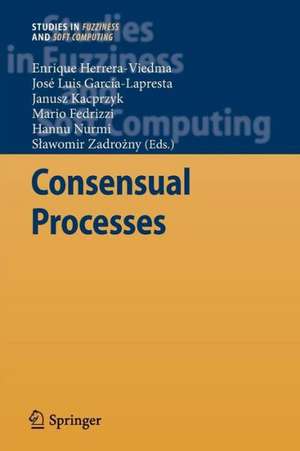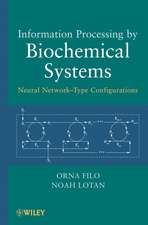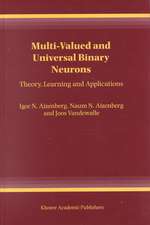Consensual Processes: Studies in Fuzziness and Soft Computing, cartea 267
Editat de Enrique Herrera-Viedma, José Luis García-Lapresta, Janusz Kacprzyk, Mario Fedrizzi, Hannu Nurmi, Sławomir Zadrożnyen Limba Engleză Paperback – 15 iul 2013
| Toate formatele și edițiile | Preț | Express |
|---|---|---|
| Paperback (1) | 994.73 lei 6-8 săpt. | |
| Springer Berlin, Heidelberg – 15 iul 2013 | 994.73 lei 6-8 săpt. | |
| Hardback (1) | 1001.49 lei 6-8 săpt. | |
| Springer Berlin, Heidelberg – 13 mai 2011 | 1001.49 lei 6-8 săpt. |
Din seria Studies in Fuzziness and Soft Computing
- 20%
 Preț: 999.85 lei
Preț: 999.85 lei - 20%
 Preț: 653.06 lei
Preț: 653.06 lei - 20%
 Preț: 872.98 lei
Preț: 872.98 lei - 20%
 Preț: 930.57 lei
Preț: 930.57 lei - 20%
 Preț: 1051.00 lei
Preț: 1051.00 lei - 20%
 Preț: 992.44 lei
Preț: 992.44 lei - 20%
 Preț: 655.85 lei
Preț: 655.85 lei - 20%
 Preț: 1001.86 lei
Preț: 1001.86 lei - 18%
 Preț: 954.14 lei
Preț: 954.14 lei - 20%
 Preț: 330.10 lei
Preț: 330.10 lei - 20%
 Preț: 333.04 lei
Preț: 333.04 lei - 20%
 Preț: 997.56 lei
Preț: 997.56 lei -
 Preț: 391.61 lei
Preț: 391.61 lei - 20%
 Preț: 647.79 lei
Preț: 647.79 lei - 20%
 Preț: 986.01 lei
Preț: 986.01 lei - 18%
 Preț: 958.56 lei
Preț: 958.56 lei - 20%
 Preț: 996.40 lei
Preț: 996.40 lei - 20%
 Preț: 999.35 lei
Preț: 999.35 lei - 15%
 Preț: 646.43 lei
Preț: 646.43 lei - 20%
 Preț: 651.57 lei
Preț: 651.57 lei - 20%
 Preț: 997.89 lei
Preț: 997.89 lei - 15%
 Preț: 641.03 lei
Preț: 641.03 lei - 20%
 Preț: 1009.74 lei
Preț: 1009.74 lei - 20%
 Preț: 992.62 lei
Preț: 992.62 lei -
 Preț: 388.72 lei
Preț: 388.72 lei - 18%
 Preț: 1223.43 lei
Preț: 1223.43 lei - 20%
 Preț: 651.42 lei
Preț: 651.42 lei - 18%
 Preț: 951.59 lei
Preț: 951.59 lei - 18%
 Preț: 948.61 lei
Preț: 948.61 lei
Preț: 994.73 lei
Preț vechi: 1243.41 lei
-20% Nou
Puncte Express: 1492
Preț estimativ în valută:
190.36€ • 206.71$ • 159.91£
190.36€ • 206.71$ • 159.91£
Carte tipărită la comandă
Livrare economică 22 aprilie-06 mai
Preluare comenzi: 021 569.72.76
Specificații
ISBN-13: 9783642268250
ISBN-10: 3642268250
Pagini: 448
Ilustrații: XVIII, 430 p.
Dimensiuni: 155 x 235 x 24 mm
Greutate: 0.63 kg
Ediția:2011
Editura: Springer Berlin, Heidelberg
Colecția Springer
Seria Studies in Fuzziness and Soft Computing
Locul publicării:Berlin, Heidelberg, Germany
ISBN-10: 3642268250
Pagini: 448
Ilustrații: XVIII, 430 p.
Dimensiuni: 155 x 235 x 24 mm
Greutate: 0.63 kg
Ediția:2011
Editura: Springer Berlin, Heidelberg
Colecția Springer
Seria Studies in Fuzziness and Soft Computing
Locul publicării:Berlin, Heidelberg, Germany
Public țintă
ResearchCuprins
Distance-based aggregation theory.- On penalty based aggregation functions and consensus.- Ranking alternatives in group decision-making with partial information: a stable approach.- Opinion changing aversion functions for group settlement modelling.- Statistical preference as a tool in consensus processes.- Consensus with oneself: within-person choice aggregation in the laboratory.- The social choice approach to group identification.- Consensus versus dichotomous voting.- On a priori evaluation of power of veto.- Settings of consensual processes: candidates, verdicts, policies.- Consensus perspectives: glimpses into theoretical advances and applications.- Measuring consensus: concepts, comparisons, and properties.- Measuring consensus in weak orders.- A qualitative reasoning approach to measure consensus.- On consensus in group decision making based on fuzzy preference relations.- Supporting consensus reaching processes under fuzzy preferences and a fuzzy majority via linguistic summaries and action rules.- Consensual processes based on mobile technologies and dynamic information.- Building consensus in on-line distributed decision making: interaction, aggregation and theconstruction of shared knowledge.- A Web-based consensus support system dealing with heterogeneous information.- A fuzzy hierarchical multiple criteria group decision support system – Decider – and itsapplications.- Product design compromise using consensus models.
Textul de pe ultima copertă
The word consensus has been frequently used for centuries, perhaps millenia. People have always deemed it important that decisions having a long lasting impact on groups, countries or even civilizations be arrived at in a consensual manner. Undoubtedly the complexity of modern world in all its social, technological, economic and cultural dimensions has created new environments where consensus is regarded desirable. Consensus typically denotes a state of agreement prevailing in a group of agents, human or software. In the strict sense of the term, consensus means that the agreement be unanimous. Since such a state is often unreachable or even unnecessary, other less demanding consensus-related notions have been introduced. These typically involve some graded, partial or imprecise concepts. The contributions to this volume define and utilize such less demanding - and thus at the same time more general - notions of consensus. However, consensus can also refer to a process whereby the state of agreement is reached. Again this state can be something less stringent than a complete unanimity of all agents regarding all options. The process may involve modifications, resolutions and /or mitigations of the views or inputs of individuals or software agents in order to achieve the state of consensus understood in the more general sense. The consensus reaching processes call for some soft computational approaches, methods and techniques, notably fuzzy and possibilistic ones. These are needed to accommodate the imprecision in the very meaning of some basic concepts utilized in the definition of consensus as a state of agreement and as a process whereby this state is to be reached. The overall aim of this volume is to provide a comprehensive overview and analysis of the issuesrelated to consensus states and consensual processes.
Caracteristici
Concerned with consensus reaching processes occuring both within human groups and groups of intelligent agents Comprehensive coverage of various issues related to consensus and consensual processes Written by leading experts in the field



























